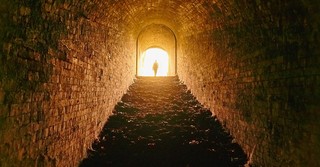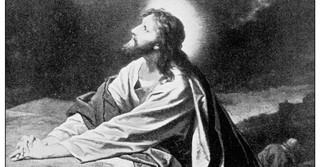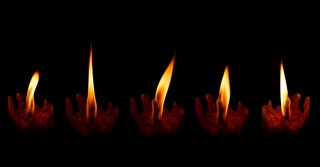What is the Dark Night of the Soul and is it in the Bible?
Share

The dark night of the soul.
I first heard about this concept as a young man. Fellow Christians in the church often spoke of it as a common experience in a believer's journey with God—a season marked by profound doubt, spiritual struggle, and even a sense of God’s absence. People would share stories of their own dark moments, describing times of inner wrestling and testing, while encouraging others to endure their own trials in faith, trusting that God’s presence and purpose remained even in silence.
But is this dark night of the soul truly biblical? Does Scripture directly address such experiences, or is it more of a spiritual tradition shaped by personal accounts and theological reflection? Where can believers find answers in the Bible about these difficult seasons?
Photo credit: ©Unsplash/Matthew Henry

What Is the Dark Night of the Soul?
The dark night of the soul refers to a time of intense doubt, struggle, or isolation. In this phase, an individual feels distant from God, even questioning their faith. The concept isn’t explicitly named in the Bible but was developed through Christian history.
St. John of the Cross, a 16th-century Spanish mystic and monk, first used the term “dark night of the soul” in his poem La Noche Oscura, which included a commentary. He taught this experience as a necessary stage in the life of a Christian, where the soul is purified and drawn closer to God. St. John saw a pattern where the “dark night” often happens after a period of spiritual revival. During it, the believer feels abandoned by God. However, God works in secret within the season to strengthen faith. It may feel like a punishment, but it’s not. God allows or provokes the “dark night” to lead people closer to him.
Part of developing this idea can be found within early Christian mystics who see the discipleship journey as a process of sanctification to become more Christlike. St. John of the Cross may have given the concept a name, but earlier theologians like St. Augustine and St. Theresa of Avila also wrote and taught similar themes of struggle and growth. For Augustine, he spoke of the soul’s “restlessness” until it finds peace in God. St. Theresa’s writings on prayer and “interior castles” provide themes on the purification of difficult times and growing intimacy with God.
My own mentor described it with the metaphor of a tree. During dry periods, a tree’s roots will dig deeper into the ground to find water, and this process provides a stronger foundation for the whole tree to thrive. God allows these times of seeming spiritual “dryness” to get people to seek desperately for him and grow a deeper faith.
During times of hardship and pain, the “dark night” tempts every person to isolate themselves and cause blame on others or even God. The test during this time is simple: will we act according to the temporary situation and how we feel? Or will we choose to find joy and endure with eternal truth, faith, and hope?
Photo Credit: ©iStock/Getty Images Plus/HiddenCatch

Bible Verses for When You're Experiencing a Dark Night of the Soul
The Bible is full of verses admitting the reality of difficult seasons of life and how God uses these to prove his strength in human weakness.
The Psalms express raw and honest emotions regarding troubles, especially those written by David, a man after God’s own heart. In Psalm 22:1-2 he cries out, “My God, my God, why have you forsaken me? Why are you so far from saving me, so far from cries of anguish?” Here David communicates the heart of feeling abandoned by God, even though the Lord had promised to make him king and bless him eternally. Psalm 42:11 refocuses the heart during such times. “Why, my soul, are you downcast? Why so disturbed within me? Put your hope in God, for I will yet praise Him, my Savior and my God.” The Scripture admits both the reality of pain and the intentional choice it takes to worship God in the midst of things difficult to understand.
Jesus clearly promises the dark times to come. “In this world you will have trouble. But take heart! I have overcome the world.” (John 16:33) He not only promises the trouble but also places it in context of his victory over the world in which the trouble happens. His victory is greater than any hardship people might face, offering great hope.
The apostle Paul suffered many things as he preached the Gospel and planted churches. He reveals this combination of struggle and hope in 2 Corinthians 4:8-9: “We are hard pressed on every side, but not crushed; perplexed, but not in despair; persecuted, but not abandoned; struck down, but not destroyed.” While there may be suffering, God will save his people and see them through the most difficult situations.
Here are more Bible verses to offer comfort and hope when you're experiencing a dark night of the soul:
Psalm 42:11
Why are you cast down, O my soul, and why are you in turmoil within me? Hope in God; for I shall again praise him, my salvation and my God.Psalm 88:1, 6
O Lord, God of my salvation, I cry out day and night before you... You have put me in the depths of the pit, in the regions dark and deep.Lamentations 3:22–23
The steadfast love of the Lord never ceases; his mercies never come to an end; they are new every morning; great is your faithfulness.Isaiah 50:10
Let him who walks in darkness and has no light trust in the name of the Lord and rely on his God.Job 23:8–10
Behold, I go forward, but he is not there... But he knows the way that I take; when he has tried me, I shall come out as gold.Psalm 34:18
The Lord is near to the brokenhearted and saves the crushed in spirit.2 Corinthians 4:8–9
We are afflicted in every way, but not crushed; perplexed, but not driven to despair; persecuted, but not forsaken; struck down, but not destroyed.Romans 8:38–39
For I am sure that neither death nor life... nor anything else in all creation, will be able to separate us from the love of God in Christ Jesus our Lord.Psalm 13:1–2, 5
How long, O Lord? Will you forget me forever? How long will you hide your face from me?... But I have trusted in your steadfast love.John 16:33
In the world you will have tribulation. But take heart; I have overcome the world.
Photo credit: ©GettyImages/Robertiez

What Bible Characters Experienced a Dark Night of the Soul?
The Bible is also full of narratives to show how God’s people experienced what we could call a “dark night of the soul.” Many also support St. John’s observation about these dark times following great revelation by God.
Joseph’s story in Genesis tells us about his trials. Betrayed by his brothers and sold into slavery, Joseph faced great injustice, even though he had just previously had a dream about his future favor and authority. As if a slave in Potiphar’s house wasn’t bad enough, he rose to prominence there but was falsely accused of sexual assault and thrown into prison (Genesis 39). He suffered in prison for years, but he remained faithful and eventually came to a position of power in Egypt. While confronting his brothers (Genesis 50), he has a big picture God moment: “You intended to harm me, but God intended it for good.”
Because of Joseph, the Israelites had favor with Pharoah, but later Egyptian kings placed the whole people group under slavery. Israel cried out for deliverance. They struggled to understand God’s plan. Through Moses, God delivered them, revealing his power and faithfulness (Exodus 3-14).
During the Babylon exile and later under Persia, Daniel continually faced trials and served faithfully. When King Darius signed a decree forbidding prayer except to himself, Daniel prayed openly to God and was thrown into a lions’ den (Daniel 6). This tested his trust in God, and God delivered him.
Peter’s denial of Christ could represent a dark night of the soul. After he promises he’ll always remain loyal to Jesus, he denies Christ three times during the night of Jesus’ arrest and trial (Luke 22:54-62). The failure leads to guilt and sorrow in Peter, but Jesus restores him after the resurrection, calling the apostle back to his purpose and mission (John 21:15-17).
Photo credit: ©Getty Images/PATSTOCK

How Did Jesus Endure His Dark Night of the Soul?
As followers of Jesus, we have no one better to learn from than Jesus himself. Our journey is walking in his footsteps through similar moments that he experienced. He was both human and divine, and his submission to God and struggle paved the way for us and the way to overcome.
After his baptism, where God affirms his pleasure in his Son, the Spirit leads Jesus into the wilderness where he fasts for 40 days, and the Devil tempts him directly (Matthew 4:1-11). Jesus experienced both extreme physical hunger and spiritual testing. Through three temptations, Jesus stood firm in obedience and overcame the Devil’s attacks.
The night before his crucifixion, Jesus first establishes the new covenant with his disciples while celebrating the deliverance of Passover. Then Jesus goes into the Garden of Gethsemane. Knowing the suffering he would face, physical and spiritual, he prays so intently he sweat drops of blood. He says, “My soul is overwhelmed with sorrow to the point of death.” (Matthew 26:38) He pleads with his Father, “My Father, if it is possible, may this cup be taken from me. Yet not as I will, but as You will.” Even in this dark hour, Jesus submits to the Father’s will and trusts his plan for redemption.
The next day, on the cross, after being whipped and mocked, Jesus repeats David’s line from the Psalms when the sky literally turned dark. Christ felt abandoned by his Father and says, “My God, my God, why have you forsaken me?” Even Jesus endured spiritual and physical anguish.
Yet this wasn’t the end. He rose again! Jesus overcame through prayer, reliance upon God, and trust in the Father’s redemptive plan. Hebrews 12:2 tells us about Christ, “For the joy set before Him, He endured the cross, scorning its shame, and sat down at the right hand of the throne of God.”
With Christ’s Spirit within us and with his guidance, we can do the same.
Photo credit: ©Getty Images/Ilbusca

What Can We Learn from the Bible about Enduring the Dark Night of the Soul?
Every one of us faces “dark nights” of the soul at some point. In the Bible, Job faced significant loss. Church history is filled with testimonies of saints and leaders who describe similar experiences. These examples remind us that these “dark nights” aren’t signs of failure or God’s displeasure but of God’s work to transform and purify us. No one enjoys pain, not even Jesus, and God doesn’t call us to enjoy it. And if Jesus went through similar dark times, and he remained sinless, then we know we don’t sin when we struggle. Like Christ, we can endure difficult seasons in love and hope.
We have hope because God doesn’t abandon his children in their darkest times. After his time of suffering, God restores Job with twice as much as he had before, proving God’s goodness and reward. In Psalm 23:4, David declares, “Even though I walk through the valley of death, I will fear no evil, for You are with me.” God’s presence and power remain with us, sustaining us, even if we don’t feel it, which is the point. We aren’t meant to place our hope or trust in temporary circumstances or our feelings but on an eternal God with forever promises.
We then find hope in God’s faithfulness and eternal good for those who follow him. “And we know that in all things God works for the good of those who love Him and are called according to his purpose.” (Romans 8:28) While we might not understand our suffering, God uses these trials to shape and strengthen us for his purpose of reconciling all creation back to himself through the Son by the Spirit. Therefore James 1:2-4 says, “Consider it pure joy, my brothers and sisters, whenever you face trials of many kinds, because you know that the testing of your faith produces perseverance. Let perseverance finish its work so that you may be mature and complete, not lacking anything.”
Our choices how impact the future joy. And knowing the eternal joy set before us, we endure the dark nights of today with hope and love. Through clinging to God’s amazing and secure promises, we endure the dark night of the soul, trusting his light will eventually shine through.
Further Reading
Overcoming the Dark Night of the Soul with the Presence of God
What is the Dark Night of the Soul?
Photo credit: ©GettyImages/chonticha wat
